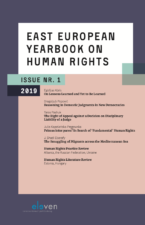Issue nr 1, 2019
- Articles
- Country reports
- Green open access from
Warning: Undefined variable $open_access_DateTime in /data02/virt74026/domeenid/www.eeyhr.eu/htdocs/w/wp-content/themes/eeyhr/single-issue.php on line 99
unknown date
During the two-and-a-half decades while Lithuania has been a party to the European Convention on Human Rights, the Grand Chamber of the European Court of Human Rights has decided five Lithuanian cases. They all (perhaps but one) raised controversial issues not only of law but also of those pertaining to matters non-legal: psychology, politics, history and so on. There had been follow-ups to most of them, allowing for consideration as to the merits and disadvantages of the respective judgments. These cases are narrated on in their wider-than-legal context and reflected upon from the perspective of their bearing on these issues and of the lessons they taught both to Lithuania, as a respondent State, and to the Court itself.
One of the shortcomings in the functioning of the justice systems in new democracies consists of insufficient reasoning in judgments. The European Court of Human Rights (Court) had to deal with the issue in cases in which applicants invoked Article 6 of the Convention for the Protection of Human Rights and Fundamental Freedoms (Convention). The Court’s case law developments concerning the issue are analysed in this article. The general rule emerged in leading cases and was subsequently followed. It says there is an obligation incumbent on national courts to provide reasons for their judgments. Therefore, insufficient reasoning in a judgment given at the domestic level of jurisdiction provides grounds for finding a violation of Article 6 of the Convention. The problem of lack of adequate reasoning in domestic judgments has been given attention among scholars, judges and practising lawyers in new democracies. The Court’s jurisprudence provides guidance to solutions aimed at improvement of the administration of justice in those countries, which are Member States of the Convention.
This article deals with the questions of scope and the standard of judicial review of a disciplinary decision against a judge. It further addresses the issue of remedial powers, which should be granted to the reviewing authority in this type of cases. It is suggested that the scope of judicial review of a disciplinary decision against a judge should extend to questions of law, fact and discretion. What actually varies is the depth of review or, more precisely, the standards of review and the corresponding level of deference, which must be demonstrated to the primary decision-making authority. It is further suggested that there are several factors that have influence on the formation of the standards of review: the institutional, procedural and expertise factors. As to the remedial capacity, the reviewing court should be provided with the competence to apply adequate remedial measures. The reviewing court should be able to effectively eliminate the identified shortcomings in the proceedings before the first-instance authority. For the effective protection of the rights at issue, it may be important for the reviewing court not only to repeal the decision subject to review, but also take other remedial measures. The legitimacy and necessity for applying particular remedial action should be established by taking into account the same institutional, procedural and expertise factors.
International human rights law is one of the most developed and codified regimes (branches) of public international law. Since 1948 and the adoption of the Universal Declaration of Human Rights, the number and scope of human rights standards evolved considerably. Prima facie this tendency reflects a generally positive phenomenon and is driven by the human rights approach in international law, but at the same time it may raise questions of the system’s efficiency, internal coherence, hierarchy of rights and mechanisms of protection and monitoring. Against the richness of human rights standards, designations such as ‘fundamental’, ‘essential’, ‘basic’, ‘crucial’ or ‘core’ are being used and ascribed to diverse concepts (inter alia, customary international human rights, erga omnes obligations, non-derogable rights, jus cogens or absolute rights). The article explores the provisions of general human rights instruments – the UDHR, the two Covenants and regional treaties, as well as relevant case-law of the ICJ, ECtHR and IACtHR in search of a definition and catalogue of fundamental human rights.
Irregular migration by sea is one of the most apparent contemporary political issues, and one that entails many legal challenges. Human smuggling by sea is only one aspect of irregular migration that represents a particular challenge for States, as sovereignty and security interests clash with the principles and obligations of human rights and refugee law. In dealing with the problem of migrant smuggling by sea, States have conflicting roles, including the protection of national borders, suppressing the smuggling of migrants, rescuing migrants and guarding human rights.
The legal framework governing the issue of migrant smuggling at sea stems not only from the rules of the law of the sea and the Smuggling Protocol but also from rules of general international law, in particular human rights law and refugee law. The contemporary practice of States intercepting vessels engaged in migrant smuggling indicates that States have, on several occasions, attempted to fragment the applicable legal framework by relying on laws that allow for enhancing border controls and implementing measures that undermine obligations of human rights and refugee law. This article seeks to discuss the human rights dimension of maritime interception missions and clarify as much as possible the obligations imposed by international law on States towards smuggled migrants and whether or not these obligations limit the capacity of States to act.
